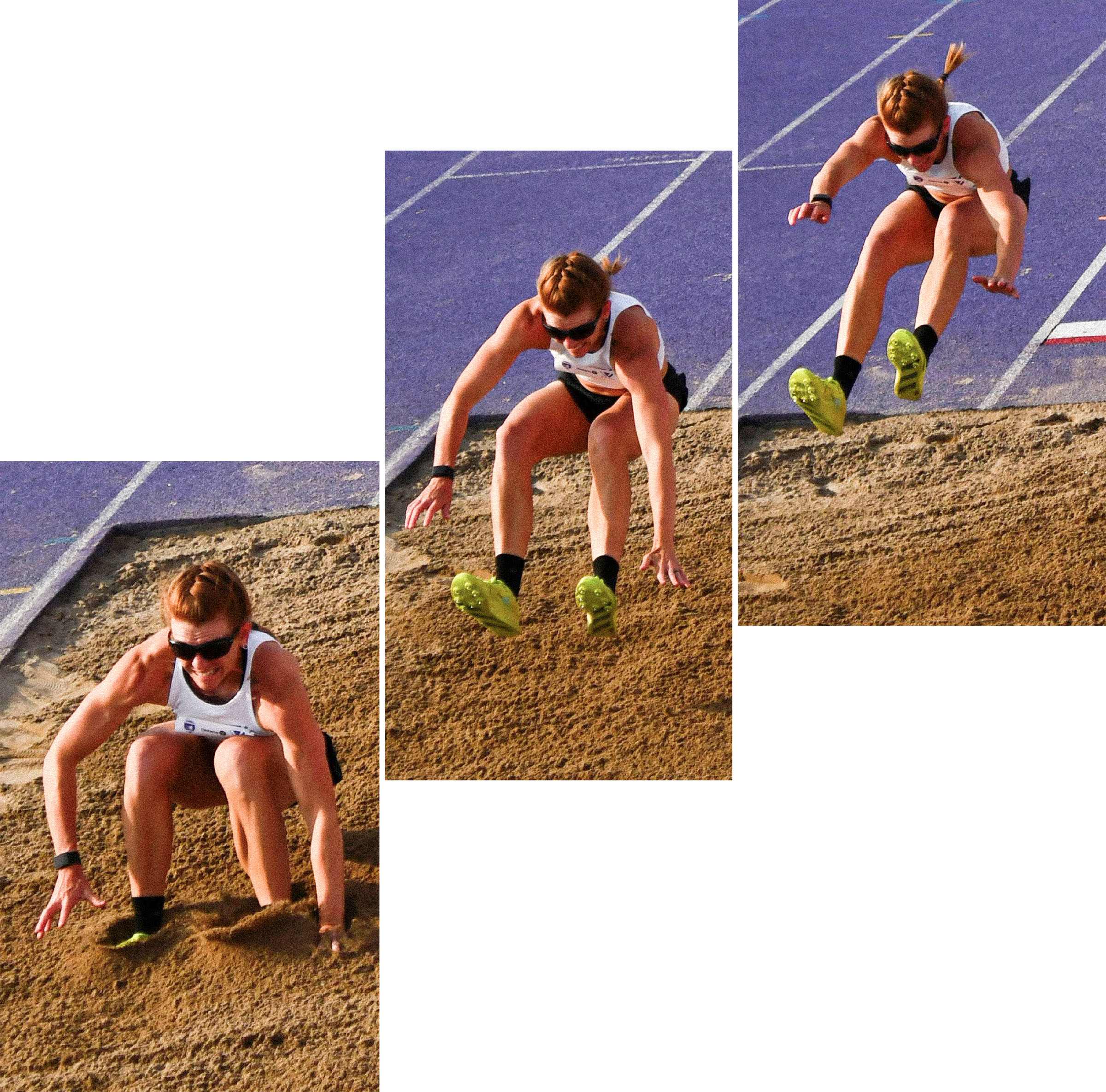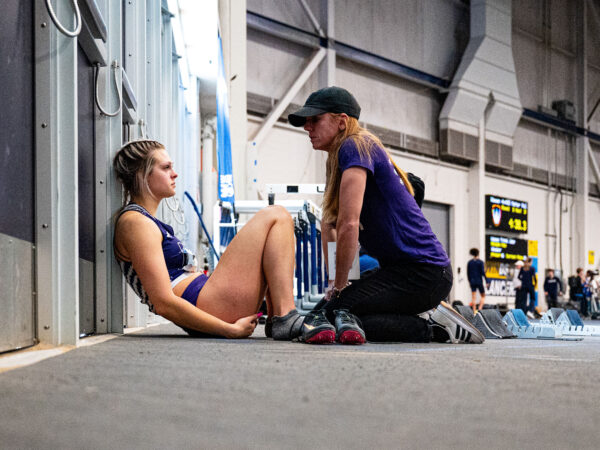Editor’s Note: Caroline Ehrhardt was named head coach of the Western Mustangs track and field team in August 2025.
The moment I landed in the sand I knew, unequivocally, that I had done it—I had just broken the Canadian record in women’s triple jump.
The competition official had barely finished reading out the number from the measuring tape when my longtime coach and the student-athletes I coached at Western tackled me in celebration.
Kneeling at the bottom of that support squad pile-up in Western’s Alumni Stadium, on a humid Sunday evening in May 2023, I thought about the turbulent road I journeyed to arrive at this long-awaited moment; a road paved by brave, persistent versions of my past self.
I had no idea how rocky my path was about to get.
Three months after breaking the record with that 14.03-metre jump at the Bob Vigars Classic, I was playing in an annual family baseball tournament when I sprained my ankle. Turns out world-class speed isn’t that helpful in baseball if you can’t also stop on a dime. I brought a little too much vel-ocity into third base and when I tried to stop, the rest of my body continued the forward momentum and I went all the way over my ankle.
The sprain was so severe the doctor said I would’ve been better off breaking my ankle. Weeks turned into months of rehab. When even surgery proved to be largely unhelpful in restoring regular function, it became clear I’d likely never walk down the stairs normally again, let alone run full speed and launch myself onto one leg to compete in the sport I loved.
I couldn’t picture my future without it. I was scared to imagine a life without track.
In the end, it was the student-athletes I coached—passing on the wisdom and support from my own mentors—who saved me. Early on in my career, I convinced myself that to be an elite athlete, I had to be selfish with my time and energy, limiting my passion to one domain. But once I met these young men and women, I couldn’t help but give them my all.
Coaching at Western, on the same track where I once trained, opened a whole new world for me.
Athletics had been a part of my life—a part of me—since I was a little kid.
I grew up in Espanola—a rural town of about 5,000 people near Sudbury, Ont. My foray into sport began when my parents signed me up for a track and field club an hour away when I was 11 years old. I was only a couple of weeks into practices when my mom’s battle with breast cancer came to a devastating end.
I learned many years later from a family friend that my parents purposely registered me when they did because they wanted me to have a hobby, a distraction, to pursue while navigating the loss of my mom at such a formative age. Track would go on to fulfill their intended purpose and then some. I enjoyed the perpetual pursuit of trying to run a little faster, jump a little farther. I especially loved triple jump; the contradictory combination of grace and aggression it required felt like a fun puzzle.
Pretty quickly, I decided I’d devote myself to being the very best triple-jumper in the country. My dad and I built a jumping pit in our backyard, and it became my oasis, a place to hone my craft throughout my teenage years.
When I was in Grade 12, I signed a full-ride scholarship to the University of Oklahoma. Just a few weeks before embarking on my next chapter, the coach—a major factor in my decision—left. I knew instantly I needed a new plan.
Western’s track and field coach Vickie Croley helped me find my next home. I look back with gratitude that the universe forced my hand, as coming to Western was the best twist of fate I could’ve asked for. As a Mustang, I won multiple national titles, set the Canadian university record in triple jump in 2015 and most importantly, met the coaches who would see me through the rest of my athletic career.
In my final year at Western, 2015, I was named athlete of the year. I was hungry for more and knew I would keep jumping after university. I had Olympic dreams and that national record to catch.
I wasn’t jumping far enough to earn funding from Canada’s national sport agency, so I worked part-time and did odd jobs—blogging for a local events website, working at a corndog stand at the Western Fair, transcribing a handwritten novel about wizards.
My now-husband Taylor Ehrhardt and I lived in a 600-square-foot apartment, both chasing our track and field goals.

Looking back, it was a grueling and stressful chapter of our lives, but also incredibly thrilling. Not long after, my otherwise healthy, marathon-running dad unexpectedly passed away—a heart attack. Being orphaned at 25 is a strange space to exist in—you’re old enough to survive on your own but also … not really. Maybe you never feel old enough to live in a world without your parents.
There I was, once again, throwing myself into sport as a way of coping with overwhelming grief and what felt like a tsunami of unfairness. But this time, I was getting older, and injuries began to plague my performance. There was a stretch, several years in a row, where I was actually trending backwards—getting further from the Canadian record instead of closer. At times, I wondered what on earth I was still doing chasing that goal, but not once did I seriously consider quitting. I had always believed with deep conviction that it was only a matter of time. The word inevitable became my mantra. The thing about inevitability is it removes the question of if and replaces it with when.
During those years of plateaued performance, I started as the volunteer horizontal jumps coach with Western’s track and field team, while continuing to compete myself. I was hesitant at first—thinking I needed single-minded focus to reach my goals—but it was one of the best decisions I ever made.
Becoming a coach served as a turning point in my own athletic career. It brought many of my best traits to the surface. The very qualities I was quick to offer my student-athletes—compassion, patience, optimism—I wasn’t generous enough to offer myself. It felt good to be their voice of reason, their soft place to land in trying times, to inspire confidence in them when their doubts were all-consuming. The closer I grew to them, the more they inspired me to be a better person and the more determined I became to show them, through my own journey, all the things I had been preaching. I wanted so badly to do right by them.
On May 28, 2023, with many of those student-athletes cheering me on, I jumped 14.03 metres and broke the 16-year-old Canadian record. It was equal parts unbelievable and totally familiar—after all, I had spent over half my life visualizing it.
I felt immense pride knowing I had become the determined woman 11-year-old me would not only have looked up to but would’ve been so proud to become. I was patient enough to stay the course, evolving until I reached that moment. Years prior, I had even gone so far as to photoshop a fake CBC Sports article detailing my hypothetical feat. That fake article, littered with creases from many moments of frustration when I had crumpled it up, now hangs adjacent to the real article in my office. It still feels surreal, and I don’t know if that sense of awe will ever wane.
But the highs don’t last forever. The sprained ankle that ended my professional career would test me to my limit.
Retirement from sport proved to be my most horrific encounter with the beast that is grief. It was a compounded loss with many complicated layers: my childhood, my connection to my parents, and most of all, a sizeable chunk of my identity.
Grieving something that isn’t human is awkward and confusing, and my healing reflected it. I struggled tremendously, but after a few months, I knew I needed to return to coaching and try to figure out my new relationship with track and field. I realized it would be vastly different, but I never considered it could eventually feel even more fulfilling.
It’s special to reach the goals you set for yourself, but being the first person someone runs to when they reach the target they’ve been striving for is indescribable. On my darkest days, I remind myself that my impact on the sport as a coach has far greater reach than my years as an athlete.
That road I devoted my life to paving? I once believed it ended on the podium or in the pit, with the realization of my ambitious goals, knowing I had become the athlete I always dreamed of being. But when I zoom out now, I can see it was just a stop along the way—and there’s still an endless road ahead for me to travel in this sport.
Caroline Ehrhardt is the Western Mustangs Track & Field assistant coach for horizontal jumps. As a student-athlete, she was recognized as a U Sports Top 8 Academic All-Canadian, an honour shared by just nine Mustangs (including Jackson Findlay) since it was established in 2013.

